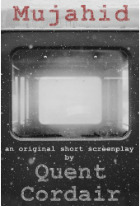This is an expanded version of my review of the book on Amazon. I may do some more reviews of my future reading.
While quite short, only 24 pages, Quent Cordair’s MUJAHID is a vivid and compelling story of two brothers, Husam and Jasim, who have very different views on life. The story is told in the form of a screenplay, which can seem a bit odd if you have never read one before, which I had not, but it did not take long before the economy with which the form allowed the story to be told took over and pulled me along for the ride.
While most of the book deals with the two boys, but we do learn something about the rest of the family. They originally lived somewhere else, likely a country in the Middle East but have lived for some time in the United States. The father is dead but both the mother and the sister, Farah, have adapted well to the Western way of life. They both wear Western clothing and refuse to cover their heads, much to Husam’s dismay. A relatively few lines of dialog show that neither are the least bit subservient to Husam, the eldest male in the house. When Husam suggest he should beat his sister for how she is dressed, Farah states that he will suffer severely if he should dare to touch her.
Throughout the screenplay we learn a lot about the two boys, and their outlooks on life. Jasim, though only 9, loves life and strives to do what he can to achieve the things he wants. When offered a chance to be first mate on a sailboat if he learns his knots, Jasim devotes every moment he can to learning them. He dreams of someday being happy and prosperous. Although he doesn’t know how he will accomplish these goals, he is confident that he can do so.
Husam on the other hand wants nothing more than to follow in his dead father’s footsteps. His goal in life is summarized when he tells his brother “to be pious and pure of mind, to follow the will of Allah, to be a mujahid like our father was, to pursue jihad until death and nothing else.”
In the course of a bus ride to downtown Chicago we see the struggle between these philosophies. A conversation between the two brothers reveals the nature of the struggle between them:
HUSAM: …Today is but one battle in a long war.
JASIM: Why must there be war, Husam? This place is so much better than where we’re from. Everything is better here. Everyone lives better here. People are happier here. I’m happier here.
HUSAM: We are not to live for happiness on earth, little brother, but to serve Allah, to sacrifice everything, our lives if asked, for Allah’s rewards hereafter.
JASIM: But I like the rewards here.
As the bus nears downtown, and the story its resolution, we learn just how much their values mean to them and the length each boy will go to preserve and promote them.
In the end, all I can say is, “I am ready for the sequel!”


Pingback: Review of “Mujahid” on Order from Chaos | As It Should Be